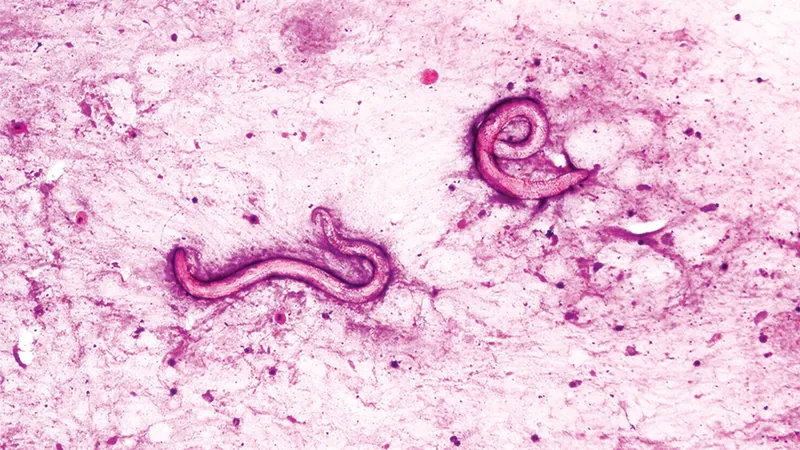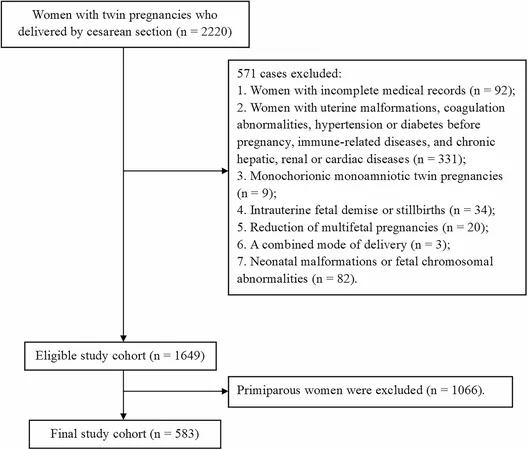
Shocking Tale of Kidney Transplant Gone Wrong: Man Infested with Parasitic Worms!
2025-07-01
Author: John Tan
A Gruesome Discovery After Transplant Surgery!
In a shocking revelation, two men were found infested with parasitic worms following kidney transplants from the same donor at two different U.S. hospitals. A case report published on June 18 in the New England Journal of Medicine details this unsettling situation.
The Victim's Health Deteriorates Rapidly!
The first recipient, a 61-year-old man who underwent surgery at Massachusetts General Hospital, fell seriously ill just ten weeks post-transplant. Initially hospitalized elsewhere, he experienced extreme nausea, vomiting, severe thirst, and intense abdominal pain. His condition worsened, resulting in respiratory failure and shock, prompting his urgent transfer to the intensive care unit.
Doctors Face a Medical Mystery!
Upon his arrival at MassGen, doctors noticed a curious purple rash spreading across his abdomen. The medical team, led by infectious disease expert Dr. Camille Kotton, delved deep into his medical history and conducted numerous tests to identify the source of his alarming symptoms.
Could It Be a Parasitic Infection?
Despite undergoing multiple treatments, gains were minimal. The classifications narrowed down the possibilities, ruling out bacterial infections due to a lack of improvement with antibiotics. With heightened levels of eosinophils—white blood cells battling parasites—the likelihood of a parasitic infection was clear.
The Startling Link to the Donor!
Dr. Kotton recalled previous instances where kidney transplants were linked to Strongyloides stercoralis, a parasitic roundworm. The team contacted the organ procurement organization and tested a sample of the deceased donor's blood, confirming that the donor's immune system had indeed encountered the worm.
A Nationwide Call to Action!
This isn’t just a stand-alone incident—data reveals that among over a decade of transplants, donor infections have impacted only 14 in every 10,000 cases. However, the review highlighted alarming statistics, with Strongyloides infections making up 42% of parasitic cases. In response, 2023 saw calls for universal testing for this menacing parasite prior to organ donation.
A Glimmer of Hope!
The medical team promptly treated the affected patient with ivermectin, a powerful drug known to combat parasitic infections. Remarkably, this treatment was administered directly under his skin, and it proved successful in addressing the widespread infestation.
Another Life Saved!
Meanwhile, alerts about the contaminated organs led to swift action at Albany Medical Center, where a 66-year-old recipient of the other kidney was experiencing alarming symptoms. By collaborating closely with MassGen, doctors successfully treated him as well.
The Importance of Vigilance in Transplants!
This harrowing experience underscores the critical need for communication among medical centers and vigilant screening protocols in organ donation. A spokesperson from Albany Medical Center remarked, "Organ transplants save lives. In rare cases like this, coordination and rapid identification of issues are paramount."

 Brasil (PT)
Brasil (PT)
 Canada (EN)
Canada (EN)
 Chile (ES)
Chile (ES)
 Česko (CS)
Česko (CS)
 대한민국 (KO)
대한민국 (KO)
 España (ES)
España (ES)
 France (FR)
France (FR)
 Hong Kong (EN)
Hong Kong (EN)
 Italia (IT)
Italia (IT)
 日本 (JA)
日本 (JA)
 Magyarország (HU)
Magyarország (HU)
 Norge (NO)
Norge (NO)
 Polska (PL)
Polska (PL)
 Schweiz (DE)
Schweiz (DE)
 Singapore (EN)
Singapore (EN)
 Sverige (SV)
Sverige (SV)
 Suomi (FI)
Suomi (FI)
 Türkiye (TR)
Türkiye (TR)
 الإمارات العربية المتحدة (AR)
الإمارات العربية المتحدة (AR)